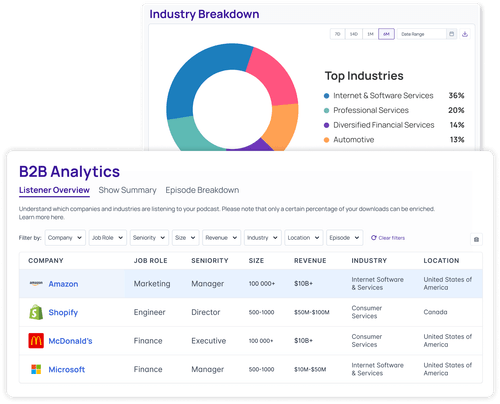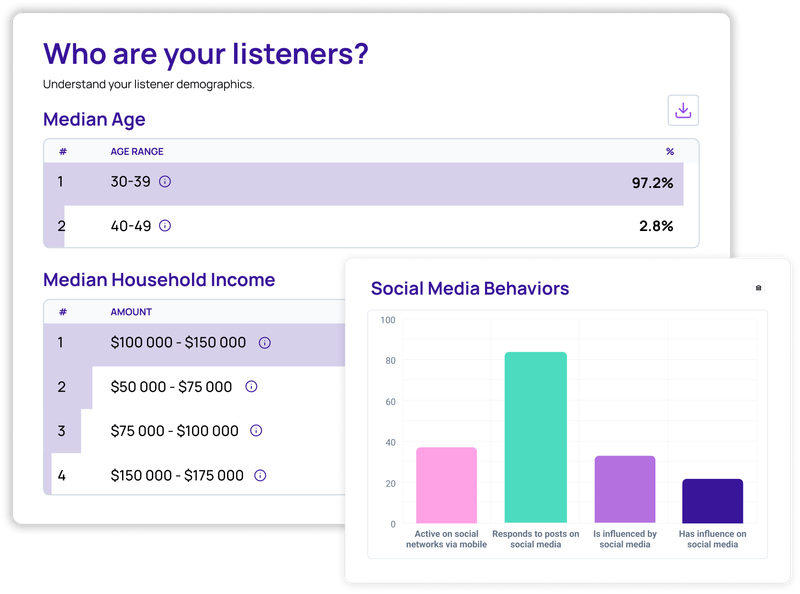Podcast analytics provide invaluable insights into listener trends, audience behavior, and the overall performance of your series; however, tracking can get confusing when trying to determine which podcast metrics actually matter.
For brands and agencies, knowing what to measure—and why—is the key to podcast growth, smarter content, and stronger ROI.
In this article, we explore the podcast analytics that all brands should be monitoring to get an in-depth, accurate picture of your series' performance.
With these insights, you'll be able to make informed decisions and maximize the effectiveness of your podcasting efforts.
TL;DR: The Podcast Analytics That Actually Matter
- Downloads are the baseline, not the benchmark: Track unique listeners to better understand true reach.
- Subscriber growth signals long-term brand affinity: Use it to measure stickiness and campaign effectiveness.
- Engagement and retention metrics (like consumption rate and drop-off points) help you shape more compelling, bingeable content.
- B2B Analytics reveal which companies, departments, and job roles are tuning in—essential for lead gen and proving ROI.
- Audience demographic data ensures you're reaching the right listeners and can power smarter targeting and content personalization.
- Bottom line: Don’t just track metrics—use them to guide creative, justify spend, and drive growth.
P.S. Check out our Podcast ROI Calculator to get an accurate read on your return on podcast investment.
.png)
Downloads and unique listeners
Downloads and unique listeners provide insight into the overall reach and popularity of your podcast.
Downloads are likely one of the most commonly used podcast metrics, but as the industry continues to push forward, we’re watching brands move away from downloads and toward unique listeners for a more accurate gauge of their podcast's popularity.
That's because, unlike downloads, which count every play you've received on your podcast, unique listeners measure the number of individual devices (iPhone, computer, etc.) that have played your show. For example, if I played a podcast episode three times, it would be counted as three downloads but only one unique listener.
We suggest tracking downloads and unique listeners across all platforms at both a show and episode level. This will help identify trends and patterns, enabling you to optimize your content and distribution strategies.
CoHost, for instance, provides an episode breakdown where you can easily compare episode performance to see what content resonates with your audience. You can even get more granular and look at metrics including “downloads by location” and “downloads by time of day” to strategically plan releases and get more precise with your campaigns.
All data that can be tracked with downloads can also be filtered out to only measure unique listeners for the most accurate measure of audience size.
Want to learn more about each podcast metric? Check out CoHost’s Ultimate Podcast Analytics Dictionary.
CoHost Tip: Want to learn more about each podcast metric? Check out CoHost’s Ultimate Podcast Analytics Dictionary.

B2B Analytics
Many brands face similar challenges when it comes to reporting podcast performance:
- They’re unable to see whether their podcast is reaching their target audience
- They can’t connect their podcast to marketing-qualified leads
- They have a hard time justifying podcast ROI without the ability to track attribution and return
But luckily, we have a solution. CoHost’s B2B Analytics tool allows brands to see which companies and job functions are listening to their show to identify valuable leads. Here’s how:
- Breakdown of companies listening: Get a detailed look at the companies who are tuning into your podcast at the show and episode level, including their industries, location, average company size, and average revenue breakdown.
- Employee job roles & seniorities: Discover the departments' employees who are listening work in (e.g. marketing, HR, finance, product) as well as their seniorities (e.g. manager, director, associate) to get a full understanding of who your listener is.
- Episode summary page: Compare the top companies, industries, company locations, and employee job functions of each episode's unique audience.
- Identify collaboration opportunities: Export the list of companies and employees who are tuning into your podcast to identify valuable prospects for guests and collaborations.
- Fill your pipeline: Connect your podcast listeners to your CRM to allow sales teams to start targeting high-value listeners.

Audience demographic data
When you venture into podcasting, you should have an ideal listener in mind, or in other words, who you’re making the podcast for. Because if you don’t know who you’re making the show for… why are you making it?
Analyzing your listeners' demographic information will help you:
- Ensure you're reaching the right audience
- Tailor episodes to your audience's preferences and interests
- Uncover new audience segments and targeting parameters for content and campaigns
With CoHost's Advanced Audience Demographics, you can see crucial information about your listeners, like age, income, family members (including pets), social media habits, lifestyle types, and more - regardless of your current hosting setup.
Subscriber growth
Subscribers are dedicated listeners who are more likely to engage with your branded podcast regularly. Tracking the growth of your subscriber base allows you to assess the long-term success of your podcast and measure its impact on building a loyal audience.
To encourage listeners to subscribe, we suggest putting calls to action at the end of your podcast episodes. Plus, promoting your podcast across various channels like social media and your website also helps drive subscriber growth.
However, an important thing to remember is that just because someone is a subscriber doesn’t necessarily mean that they listened to an episode. Many apps will automatically download episodes from shows that you follow or subscribe to, but you’re not always hitting that play button.
For marketers, subscriber trends can be a powerful signal of audience intent and stickiness. If growth slows, revisit your content cadence, distribution strategy, or promotion tactics.

Listener engagement and retention
Among the most crucial metrics for your podcast are listener engagement and retention metrics.
They let you know whether your content is resonating with your audience.
- Are people listening all the way through?
- How many are dropping off before the mid-way mark?
- Is there a particular segment that's missing the mark?
Engagement metrics go deeper to answer all the above questions and more. Here are some key points to track:
Consumption rate/average listening duration:
This metric helps determine how much of your episodes listeners are consuming. Analyzing the average listening duration can indicate whether your content is resonating with your audience or if there's room for improvement. We typically recommend you aim for a 75% or higher listening duration. You can find this metric in your CoHost dashboard.
Listener drop-off points:
Identifying specific points within your episodes where listeners tend to drop off can help you identify potential weaknesses in your content or delivery. Were there too many ads? Did the conversation stray too far off-topic? By understanding these drop-off points, you can make adjustments to captivate your audience throughout the entire episode.
Listener reviews:
Encouraging listener feedback and monitoring reviews provides qualitative insights into how your branded podcast is being received. Pay attention to constructive criticism and positive feedback to refine your podcast and tailor it to your audience's preferences.
For brands, high retention and strong consumption are signals that your content is building real connection—not just reach.
Where to find podcast analytics & insights
Not all podcast data is created equal—and not all of it lives in the same place.
If you want a complete picture of your podcast’s performance, you’ll need to gather insights across a few key sources:
- Podcast hosting platforms: Most podcast hosts provide basic analytics like downloads, unique listeners, and sometimes location data. These are a great starting point for understanding overall performance trends.
- Listening apps: Platforms like Spotify and Apple Podcasts offer platform-specific insights, including consumption rates, listener retention, and follower counts. While helpful, they only reflect one slice of your audience.
- Third-party analytics tools: If you want deeper insights—especially around audience behavior, attribution, or firmographics—you’ll need tools built specifically for podcast measurement.
- Marketing and analytics integrations: Tools like UTM tracking, Google Analytics, and CRM integrations can help tie podcast performance to broader marketing KPIs.
And if you’re looking to centralize this data and go beyond surface-level stats, tools like CoHost combine hosting and advanced analytics to give brands and agencies the full picture.
With CoHost, you get:
- B2B Analytics: See which companies, industries, and job functions are tuning in
- Advanced Audience Demographics: Understand who your listeners are and how to better serve them
- Consumption Metrics: Uncover what’s keeping audiences engaged—and where they drop off
- Tracking Links: Attribute audience growth to the campaigns and channels driving real results
- Hosting-agnostic setup: Access key data via our Analytics Prefix—no need to switch hosting platforms if you’re comfy where you are
Whether you’re building a content strategy, proving ROI, or reporting up to leadership, knowing where to find the right data is the first step.
Measuring the podcast analytics that matter
Measuring the success and impact of your podcast requires a thoughtful analysis of key metrics that go beyond basic download numbers.
Focus on unique listeners, subscribers, engagement, and conversion metrics to gain valuable insights into your podcast's performance and make informed decisions to improve its effectiveness.
By harnessing the right podcast analytics, you’ll stop guessing and start growing.
Want more insights into the world of podcast analytics? Sign up for our bi-weekly newsletter, Tuned In, where we cover everything from branded podcasts tips to expert advice, industry data, and hot takes.




.webp)






